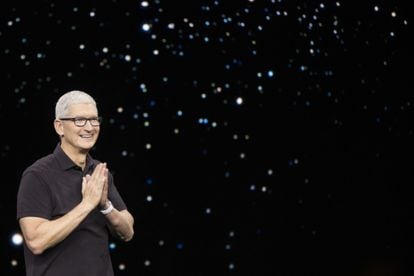Apple CEO Tim Cook was asked in 2022 if Apple was going to fix problems with its messaging service between iPhones and Android phones. “It’s tough, not to make it personal, but I can’t send my mom certain videos,” he was told. “Buy your mom an iPhone,” Cook replied. The exchange is included in the lawsuit that has been filed by the U.S. Department of Justice (DOJ) and attorneys general in 16 states against the tech giant, which is accused of violating antitrust laws by abusing its position of dominance. Prosecutors have compared the lawsuit to other landmark cases, such as the one they brought against Microsoft. Then, Microsoft complained about the abuses of its rival. Now, it is Apple that is accused of illegal monopolistic practices.
The Department of Justice’s lawsuit reviews the history of the company, founded in 1976 by Steve Jobs and Steve Wozniak in the former’s home. From the beginning, the company focused on high-end, carefully designed personal computers, with an intuitive operating system that was later replicated to a large extent by Microsoft, with greater success. At the end of the last century Apple was on the verge of bankruptcy, displaced by manufacturers of cheaper computers using Windows.
The company’s fortunes changed for the better largely thanks to the launch of the iPod in 2001, associated with its iTunes application that brought consumers and record labels together on a single platform. The Department of Justice recalls that it was the antitrust case against Microsoft that opened up the market and limited Bill Gates’ company’s ability to prohibit rivals like Apple from offering iTunes on computers running the Windows operating system.

In 1998, Jobs criticized Microsoft’s monopoly and “dirty tactics” in operating systems to attack Apple, prompting the company to go to the Department of Justice in the hope of getting Microsoft to “play fair.” The success of the antitrust action against Microsoft allowed the success of the iPod and iTunes to multiply.
The entry of iTunes into Windows boosted the iPod and contributed to the development and success of Apple’s next flagship product, the revolutionary iPhone, which took the company to the top. “But after launching the iPhone, Apple began stifling the development of cross-platform technologies on the iPhone, just as Microsoft tried to stifle cross-platform technologies on Windows,” the DOJ notes.
Nearly all the apps on the first iPhone, released in 2007, were created by Apple. There were just over a dozen: Calendar, Camera, Clock, Contacts, iPod, Messages, Notes, Phone, Photos, Safari, Stock, Voice Memos and Weather. A year after the launch of its smartphone, Apple invited third-party developers to create native apps for its revolutionary mobile.
That proved to be a double-edged sword. The economics of a smartphone platform are such that the value of the platform to users and, in turn, to the platform operator itself increases when new apps and new features are added. But if those features threaten the platform itself, or migration to another platform is easy, they can end up hurting it.
Apple’s decision to invite third parties and the resulting proliferation of apps generated tens of billions of dollars in profits for the company and enabled it to reach an iPhone user base of more than 250 million devices in the United States. The company has a market share of over 70% of the high-performance smartphone market and over 65% of the overall smartphone market.
To avoid risks, Apple maintained tight control over its App Store, enforcing its rules arbitrarily, according to the DOJ. “It frequently uses App Store rules and restrictions to penalize and restrict developers who take advantage of technologies that threaten to disrupt, disintermediate, compete with, or erode Apple’s monopoly power,” the lawsuit contends. “Apple selectively designates APIs as public or private to benefit Apple, limiting the functionality that developers can offer iPhone users, even when the same functionality is available in Apple’s own apps, or even in select third-party apps,” it adds.

Enormous power
Apple’s control over the distribution and creation of apps gives it enormous power. “Limiting the features and functionality created by third-party developers — and therefore available to iPhone users — makes the iPhone worse and deprives Apple of the economic value it would gain as the platform operator. It makes no economic sense for Apple to sacrifice the profits it would earn from new features and functionality unless it has some other compensating reason to do so, such as protecting its monopoly profits,” the brief asserts.
The DOJ’s lawsuit focuses on five areas where it believes abuses of dominance have been most evident: messaging services, digital wallet, the interlinking of the iPhone with smartwatches in favor of the Apple Watch, super apps (WeChat-style, which serve as a gateway to assorted utilities) and cloud streaming services, particularly for video games.
Apple has created such barriers to entry in the mobile market that large companies with enormous resources have had to throw in the towel. Amazon launched its Fire cell phone in 2014, but was unable to sustain its business profitably and abandoned it the following year; Microsoft abandoned its mobile business in 2017; HTC left the market when it sold its smartphone business to Google in September 2017; and LG pulled out in 2021. Only Samsung and Google remain significant competitors in the U.S. smartphone market. “The barriers are so high that Google is a distant third party to Apple and Samsung despite the fact that Google controls the development of the Android operating system,” the lawsuit says.
“Apple charges as much as nearly $1,600 for an iPhone,” U.S. Attorney General Merrick Garland noted Thursday in announcing the lawsuit. “But as our complaint alleges, Apple has maintained monopoly power in the smartphone market not simply by staying ahead of the competition on the merits, but by violating federal antitrust law. Consumers should not have to pay higher prices because companies break the law.”
The lawsuit seeks a declaration that Apple has violated antitrust law and that all kinds of corrective measures be imposed. These include stopping it from shutting out super apps and cloud streaming apps; making way for third-party messaging and digital wallet apps; making other competitors’ smartwatches compatible; and generally preventing anti-competitive practices through its app stores. The lawsuit, for the time being, has in one day cost the company more than $100 billion in its stock market value.
A quarter of a century after the company founded by Jobs and Wozniak revolted against Microsoft’s anti-competitive practices, the judges will have their say on whether it is Apple that now violates antitrust laws with the iPhone.
Sign up for our weekly newsletter to get more English-language news coverage from EL PAÍS USA Edition




















